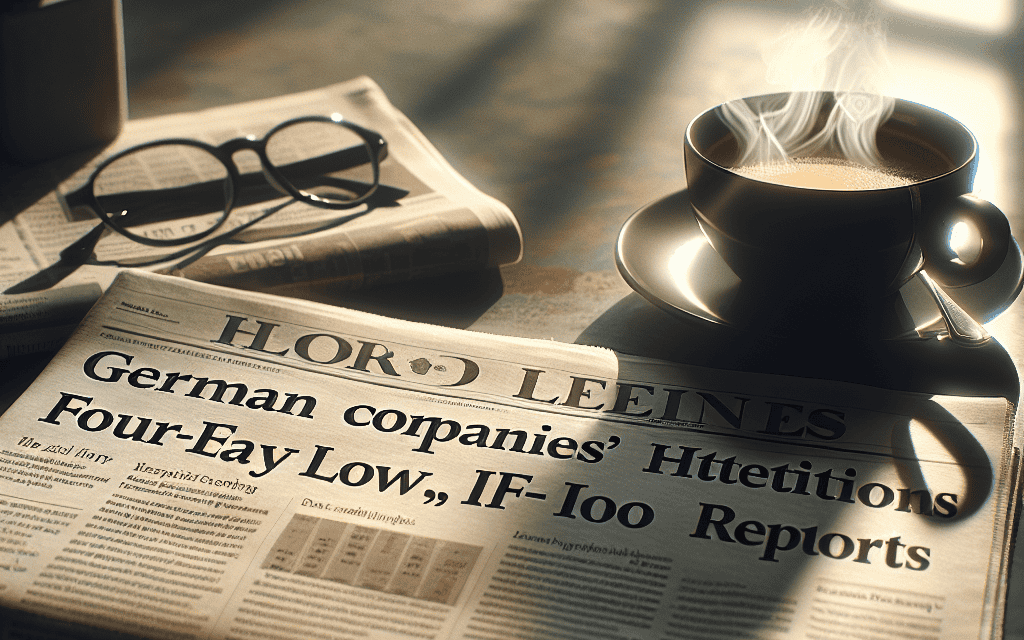“German Hiring Slows: Ifo Reports Lowest Intentions in Four Years”
Introduction
In recent developments, the hiring intentions of German companies have reached their lowest point in four years, according to a report by the Ifo Institute. This decline reflects growing concerns over economic uncertainties and challenges facing Europe’s largest economy. The Ifo Employment Barometer, a key indicator of labor market trends, has shown a significant drop, suggesting that businesses are becoming increasingly cautious about expanding their workforce. Factors such as global economic slowdowns, supply chain disruptions, and geopolitical tensions are contributing to this conservative approach. As Germany navigates these turbulent times, the report underscores the need for strategic measures to bolster economic confidence and stimulate job growth.
Analysis Of The Decline In Hiring Intentions Among German Companies
The recent report from the Ifo Institute reveals a significant decline in hiring intentions among German companies, marking the lowest level in four years. This downturn in employment prospects is a reflection of broader economic challenges that Germany, Europe’s largest economy, is currently facing. To understand the implications of this trend, it is essential to examine the underlying factors contributing to this decline and consider the potential consequences for the German labor market and economy.
Firstly, the global economic environment has been fraught with uncertainty, which has inevitably impacted Germany’s export-driven economy. Trade tensions, geopolitical conflicts, and the lingering effects of the COVID-19 pandemic have disrupted supply chains and dampened international demand. Consequently, German companies are exercising caution in their hiring practices, opting to wait for more stable conditions before expanding their workforce. This cautious approach is further exacerbated by the energy crisis, which has led to increased production costs and squeezed profit margins for many businesses.
Moreover, the German economy is grappling with structural changes that are influencing hiring intentions. The transition towards a more digital and sustainable economy requires companies to invest in new technologies and adapt their business models. While this transformation presents opportunities for growth, it also necessitates a reevaluation of workforce needs. Companies may be hesitant to hire until they have a clearer understanding of the skills required for future success. This shift in focus from traditional roles to more specialized positions may temporarily suppress overall hiring activity.
In addition to these economic and structural factors, demographic trends are also playing a role in shaping hiring intentions. Germany’s aging population is leading to a shrinking labor force, which poses challenges for companies seeking to fill vacancies. The competition for skilled workers is intensifying, and businesses may be reluctant to commit to new hires without assurance of finding suitable candidates. This demographic shift underscores the importance of investing in education and training to equip the workforce with the skills needed for emerging industries.
Furthermore, the current inflationary pressures are influencing corporate hiring decisions. Rising costs of living and wage demands are putting additional strain on company budgets. As businesses strive to balance these financial pressures, they may prioritize cost-cutting measures over expanding their workforce. This cautious financial management is a prudent response to the volatile economic climate but contributes to the overall decline in hiring intentions.
Despite these challenges, it is important to recognize that the decline in hiring intentions does not necessarily indicate a long-term trend. As the global economy stabilizes and Germany continues to adapt to new economic realities, there is potential for a rebound in employment prospects. Policymakers and business leaders must work collaboratively to address the current obstacles and foster an environment conducive to job creation. This includes investing in infrastructure, supporting innovation, and implementing policies that encourage workforce participation.
In conclusion, the Ifo Institute’s report on the decline in hiring intentions among German companies highlights a complex interplay of economic, structural, and demographic factors. While the current outlook may appear challenging, it also presents an opportunity for Germany to reassess its economic strategies and workforce development initiatives. By addressing these issues proactively, Germany can position itself for a more resilient and dynamic labor market in the future.
Factors Contributing To The Four-Year Low In German Employment Plans
The recent report from the Ifo Institute, indicating that German companies’ hiring intentions have reached a four-year low, has raised concerns about the underlying factors contributing to this trend. As Europe’s largest economy, Germany’s employment plans are often seen as a barometer for broader economic health. Several interrelated factors have converged to create this downturn in hiring intentions, reflecting both domestic and international challenges.
To begin with, the global economic environment has been marked by uncertainty, which has inevitably impacted German businesses. Trade tensions, particularly between major economies such as the United States and China, have created a ripple effect, influencing global supply chains and market stability. German companies, heavily reliant on exports, have felt the pressure as demand for their goods fluctuates. This uncertainty has made businesses more cautious, leading them to adopt a wait-and-see approach rather than expanding their workforce.
Moreover, the energy crisis exacerbated by geopolitical tensions has further strained German industries. The reliance on energy imports, particularly from Russia, has exposed vulnerabilities in the energy supply chain. As energy prices soar, companies face increased operational costs, which in turn affects their profitability and investment capacity. Consequently, businesses are prioritizing cost management over expansion, resulting in reduced hiring intentions.
In addition to external pressures, internal economic challenges have also played a significant role. The German economy has been grappling with sluggish growth, partly due to structural issues such as an aging population and a shrinking workforce. These demographic trends have long-term implications for labor market dynamics, as a smaller pool of workers can limit economic expansion. Companies may be hesitant to hire in such an environment, anticipating potential difficulties in finding skilled labor and the associated costs of training and development.
Furthermore, the ongoing digital transformation across industries has altered the landscape of employment. While technological advancements offer opportunities for innovation and efficiency, they also necessitate a shift in workforce skills. Many German companies are in the process of adapting to these changes, which involves significant investment in technology and employee training. This transition period can lead to a temporary slowdown in hiring as businesses reassess their workforce needs and focus on upskilling existing employees.
Additionally, the regulatory environment in Germany presents its own set of challenges. Labor laws and regulations, while designed to protect workers, can sometimes be perceived as rigid and burdensome for employers. The complexities involved in hiring and managing employees may deter companies from expanding their workforce, especially in uncertain economic times. This regulatory landscape, combined with high labor costs, can influence companies’ decisions to limit hiring.
In conclusion, the four-year low in German companies’ hiring intentions, as reported by the Ifo Institute, is the result of a confluence of factors. Global economic uncertainties, energy supply challenges, demographic shifts, technological transformations, and regulatory complexities all contribute to the cautious stance adopted by businesses. As these issues continue to evolve, it remains crucial for policymakers and industry leaders to address these challenges collaboratively, ensuring that Germany’s labor market remains resilient and adaptable in the face of ongoing changes.
Impact Of Economic Conditions On German Hiring Trends
The recent report from the Ifo Institute reveals a significant downturn in hiring intentions among German companies, marking the lowest level in four years. This development is a reflection of the broader economic conditions currently affecting Germany, Europe’s largest economy. As businesses navigate a complex landscape characterized by global uncertainties, supply chain disruptions, and fluctuating demand, their cautious approach to hiring underscores the challenges they face.
To understand the implications of this trend, it is essential to consider the economic backdrop against which these decisions are being made. Germany, like many other nations, is grappling with the lingering effects of the COVID-19 pandemic, which has disrupted industries and altered consumer behavior. Additionally, geopolitical tensions, particularly those involving key trading partners, have introduced further unpredictability into the market. These factors have collectively contributed to a climate of economic uncertainty, prompting companies to reassess their growth strategies and, consequently, their hiring plans.
Moreover, the energy crisis exacerbated by the conflict in Ukraine has placed additional strain on German businesses. With energy prices soaring, companies are facing increased operational costs, which in turn affect their profitability and investment capabilities. This situation has led many firms to adopt a more conservative stance, prioritizing cost management over expansion. As a result, hiring intentions have been scaled back, as businesses seek to maintain financial stability in the face of rising expenses.
In addition to these external pressures, internal factors within Germany are also influencing hiring trends. The country is experiencing a demographic shift, with an aging population and a shrinking workforce. This demographic challenge is compounded by a skills gap, as the demand for specialized skills in technology and engineering outpaces the supply of qualified candidates. Consequently, companies are finding it increasingly difficult to fill positions, which further dampens their enthusiasm for expanding their workforce.
Despite these challenges, it is important to note that not all sectors are equally affected. The technology and renewable energy sectors, for instance, continue to exhibit robust growth, driven by innovation and the global push towards sustainability. These industries are actively seeking talent to support their expansion, highlighting a divergence in hiring trends across different sectors. However, the overall sentiment remains cautious, as companies in more traditional industries, such as manufacturing and automotive, face greater headwinds.
In response to these conditions, policymakers and industry leaders are exploring strategies to stimulate economic growth and support the labor market. Initiatives aimed at enhancing workforce skills, promoting digital transformation, and fostering innovation are being prioritized to address the structural challenges facing the economy. Additionally, efforts to strengthen trade relationships and diversify energy sources are underway to mitigate external risks and bolster economic resilience.
In conclusion, the decline in hiring intentions among German companies, as reported by the Ifo Institute, reflects a confluence of economic challenges that are shaping the current business environment. While certain sectors continue to thrive, the overall cautious approach to hiring underscores the need for strategic interventions to support economic recovery and ensure long-term growth. As Germany navigates this complex landscape, the focus on adaptability and resilience will be crucial in overcoming the obstacles that lie ahead.
Ifo Report Insights: Understanding The German Labor Market Shift

The recent report from the Ifo Institute has revealed a significant shift in the German labor market, as hiring intentions among companies have reached their lowest point in four years. This development is indicative of broader economic trends and challenges that are currently influencing the German economy. As Europe’s largest economy, Germany’s labor market dynamics are closely watched, and the latest findings from the Ifo Institute provide valuable insights into the underlying factors contributing to this downturn in hiring intentions.
To begin with, the decline in hiring intentions can be attributed to a confluence of economic uncertainties that have been mounting over recent months. The global economic landscape has been marked by volatility, with geopolitical tensions, supply chain disruptions, and fluctuating energy prices creating an environment of unpredictability. German companies, which are deeply integrated into global trade networks, are particularly sensitive to these external pressures. Consequently, many firms are adopting a cautious approach, opting to delay or scale back their hiring plans as they navigate these uncertain waters.
Moreover, the energy crisis, exacerbated by the ongoing conflict in Ukraine, has had a profound impact on German industries. As a nation heavily reliant on energy imports, Germany has faced significant challenges in securing stable and affordable energy supplies. This has led to increased production costs for businesses, particularly in energy-intensive sectors such as manufacturing and chemicals. In response, companies are reassessing their operational strategies, with some opting to invest in automation and efficiency improvements rather than expanding their workforce.
In addition to external economic pressures, internal factors within Germany are also playing a role in shaping hiring intentions. The country is experiencing demographic changes, with an aging population and a shrinking workforce. This demographic shift is creating a tighter labor market, where companies are finding it increasingly difficult to attract and retain skilled workers. As a result, businesses are becoming more selective in their hiring processes, focusing on quality over quantity when it comes to new recruits.
Furthermore, the transition towards a more digital and sustainable economy is influencing hiring patterns. As industries adapt to technological advancements and environmental regulations, there is a growing demand for workers with specialized skills in areas such as information technology, renewable energy, and green technologies. However, the supply of such skilled workers is not keeping pace with demand, leading to a skills mismatch in the labor market. This mismatch is prompting companies to reconsider their hiring strategies, often opting to invest in training and development for existing employees rather than expanding their workforce.
Despite these challenges, it is important to note that the German labor market remains resilient. Unemployment rates are still relatively low compared to historical standards, and there are sectors that continue to experience growth and demand for labor. The healthcare and logistics industries, for example, are seeing sustained hiring activity due to ongoing societal needs and the rise of e-commerce.
In conclusion, the Ifo Institute’s report on German companies’ hiring intentions highlights a complex interplay of external and internal factors that are reshaping the labor market. While current hiring intentions may be subdued, the underlying resilience of the German economy, coupled with strategic adaptations by businesses, suggests that the labor market will continue to evolve in response to these challenges. As companies navigate this period of uncertainty, their ability to adapt and innovate will be crucial in determining the future trajectory of the German labor market.
Strategies For German Companies To Navigate Hiring Challenges
In recent months, German companies have faced a significant downturn in their hiring intentions, reaching a four-year low, as reported by the Ifo Institute. This development poses a considerable challenge for businesses across various sectors, necessitating strategic adaptations to navigate the evolving economic landscape. As companies grapple with this shift, it becomes imperative to explore effective strategies that can help them manage these hiring challenges while maintaining operational efficiency and competitiveness.
To begin with, one of the primary strategies that German companies can adopt is enhancing their focus on internal talent development. By investing in the upskilling and reskilling of existing employees, businesses can mitigate the need for external hiring. This approach not only helps in filling skill gaps but also boosts employee morale and retention. Companies can implement comprehensive training programs, workshops, and mentorship initiatives to ensure that their workforce remains agile and adaptable to changing market demands. Moreover, fostering a culture of continuous learning can empower employees to take on new roles and responsibilities, thereby reducing the dependency on external recruitment.
In addition to internal talent development, companies should consider leveraging technology to streamline their hiring processes. The integration of artificial intelligence and data analytics can significantly enhance the efficiency of recruitment efforts. By utilizing AI-driven tools, businesses can automate repetitive tasks such as resume screening and candidate assessment, allowing human resources teams to focus on more strategic aspects of hiring. Furthermore, data analytics can provide valuable insights into labor market trends, enabling companies to make informed decisions about their recruitment strategies. This technological approach not only saves time and resources but also ensures that companies are better equipped to identify and attract top talent.
Another crucial strategy involves reevaluating and optimizing the employer value proposition. In a competitive job market, attracting and retaining talent requires more than just offering competitive salaries. Companies must emphasize their unique strengths and values, such as a positive work culture, opportunities for career advancement, and a commitment to diversity and inclusion. By clearly communicating these aspects, businesses can differentiate themselves from competitors and appeal to potential candidates who align with their organizational values. Additionally, fostering a strong employer brand can enhance the company’s reputation, making it a more attractive destination for job seekers.
Furthermore, companies should explore flexible work arrangements as a means to address hiring challenges. The COVID-19 pandemic has accelerated the shift towards remote and hybrid work models, and many employees now prioritize flexibility in their job search. By offering flexible work options, such as remote work or flexible hours, companies can tap into a broader talent pool and accommodate the diverse needs of their workforce. This approach not only enhances employee satisfaction but also increases the likelihood of attracting candidates who may have otherwise been deterred by rigid work structures.
Lastly, collaboration with educational institutions and industry partners can play a pivotal role in addressing hiring challenges. By establishing partnerships with universities, vocational schools, and industry associations, companies can create pipelines for future talent. These collaborations can involve internships, apprenticeships, and co-op programs that provide students with practical experience while allowing companies to identify and nurture potential employees early on. Such initiatives not only benefit businesses by ensuring a steady supply of skilled workers but also contribute to the overall development of the labor market.
In conclusion, as German companies face a decline in hiring intentions, it is essential for them to adopt a multifaceted approach to navigate these challenges effectively. By focusing on internal talent development, leveraging technology, optimizing the employer value proposition, embracing flexible work arrangements, and fostering collaborations with educational institutions, businesses can position themselves for success in an increasingly competitive job market. Through these strategies, companies can not only overcome current hiring obstacles but also build a resilient workforce capable of driving future growth and innovation.
The Role Of Industry-Specific Trends In German Employment Intentions
The recent report from the Ifo Institute, indicating that German companies’ hiring intentions have reached a four-year low, underscores the significant impact of industry-specific trends on employment intentions. As Germany stands as Europe’s largest economy, the fluctuations in its labor market are often reflective of broader economic conditions. However, a closer examination reveals that these hiring intentions are not uniformly distributed across all sectors. Instead, they are heavily influenced by the unique challenges and opportunities present within specific industries.
To begin with, the manufacturing sector, a cornerstone of the German economy, has been experiencing a period of uncertainty. Global supply chain disruptions, exacerbated by geopolitical tensions and the lingering effects of the COVID-19 pandemic, have led to a cautious approach in hiring. Companies within this sector are grappling with fluctuating demand and rising costs of raw materials, prompting them to reassess their workforce needs. Consequently, many manufacturing firms are opting to delay expansion plans and focus on optimizing their current operations, which in turn affects their hiring intentions.
In contrast, the technology sector in Germany presents a different narrative. Despite the overall decline in hiring intentions, tech companies continue to exhibit robust demand for skilled professionals. The digital transformation accelerated by the pandemic has created a surge in demand for IT services, cybersecurity, and software development. As a result, tech firms are actively seeking talent to support innovation and maintain competitive advantage. This divergence highlights how industry-specific trends can lead to varying employment strategies, even within the same economic landscape.
Moreover, the automotive industry, another key pillar of the German economy, is undergoing a transformative phase. The shift towards electric vehicles and sustainable practices is reshaping the industry’s employment landscape. While traditional roles related to internal combustion engines may see a decline, there is a growing demand for expertise in electric vehicle technology and renewable energy solutions. This transition necessitates a strategic realignment of workforce skills, influencing hiring intentions as companies seek to balance legacy operations with future-oriented initiatives.
Additionally, the service sector, particularly hospitality and tourism, has been significantly impacted by the pandemic. Although there has been a gradual recovery, uncertainties regarding travel restrictions and consumer confidence continue to pose challenges. Companies in this sector are adopting a cautious approach, often relying on temporary or flexible staffing solutions to navigate the unpredictable market conditions. This hesitancy in committing to long-term hiring reflects the broader uncertainty that pervades the industry.
Furthermore, the energy sector is facing its own set of challenges and opportunities. The global push towards renewable energy sources is driving demand for green technologies and sustainable practices. German companies in this sector are increasingly focusing on innovation and sustainability, which requires a workforce equipped with specialized skills. Consequently, hiring intentions in the energy sector are shaped by the need to align with environmental goals and regulatory requirements.
In conclusion, the Ifo Institute’s report on the decline in German companies’ hiring intentions highlights the critical role of industry-specific trends in shaping employment strategies. While some sectors face challenges that necessitate cautious hiring, others are driven by innovation and transformation, leading to increased demand for specialized skills. Understanding these nuances is essential for policymakers and business leaders as they navigate the complexities of the labor market and strive to foster economic resilience. As Germany continues to adapt to evolving global dynamics, the interplay between industry trends and employment intentions will remain a key factor in shaping the country’s economic future.
Future Outlook: Will German Hiring Intentions Rebound?
The recent report from the Ifo Institute, a leading economic research organization in Germany, has revealed a concerning trend: German companies’ hiring intentions have plummeted to their lowest level in four years. This development raises questions about the future outlook for employment in Europe’s largest economy and whether these intentions will rebound in the near term. To understand the implications of this trend, it is essential to examine the factors contributing to the decline and consider potential scenarios that could influence a recovery.
Firstly, the current economic climate in Germany is characterized by a mix of challenges that have collectively dampened business confidence. The lingering effects of the COVID-19 pandemic, coupled with supply chain disruptions and geopolitical tensions, have created an environment of uncertainty. As companies navigate these complexities, many are adopting a cautious approach to expansion and hiring. This hesitancy is reflected in the Ifo report, which indicates that businesses are prioritizing cost management and operational efficiency over workforce growth.
Moreover, the energy crisis exacerbated by the conflict in Ukraine has further strained the German economy. With energy prices soaring, companies face increased production costs, which in turn impact their profitability and investment capacity. In such a scenario, hiring new employees becomes a less attractive option, as firms focus on maintaining financial stability. Additionally, the transition towards greener energy sources, while necessary, presents its own set of challenges and costs, adding another layer of complexity to the economic landscape.
Despite these hurdles, there are reasons to remain cautiously optimistic about the potential for a rebound in hiring intentions. One key factor is the resilience of the German labor market, which has historically demonstrated an ability to adapt to changing conditions. The country’s strong vocational training system and emphasis on skill development provide a solid foundation for workforce adaptability. As businesses adjust to new market realities, they may eventually recognize the need to invest in human capital to drive innovation and competitiveness.
Furthermore, government policies aimed at stimulating economic growth could play a pivotal role in reversing the current trend. Initiatives such as fiscal stimulus packages, investment in infrastructure, and support for digital transformation may create new opportunities for businesses, encouraging them to expand their workforce. Additionally, efforts to strengthen trade relations and diversify supply chains could mitigate some of the external pressures currently weighing on the economy.
In the medium to long term, demographic trends may also influence hiring intentions. Germany’s aging population presents both challenges and opportunities for the labor market. While an older workforce may lead to skill shortages in certain sectors, it also underscores the importance of attracting and retaining talent. Companies that proactively address these demographic shifts by offering flexible work arrangements and investing in employee development may find themselves better positioned to capitalize on future growth opportunities.
In conclusion, while the Ifo report paints a sobering picture of current hiring intentions among German companies, it is important to consider the broader context and potential for recovery. The interplay of economic, policy, and demographic factors will ultimately shape the trajectory of employment in Germany. By remaining adaptable and responsive to these dynamics, businesses and policymakers alike can work towards fostering an environment conducive to renewed hiring and economic vitality. As the situation evolves, close monitoring and strategic action will be essential to ensure that Germany’s labor market remains robust and resilient in the face of ongoing challenges.
Q&A
1. **What is the main finding of the Ifo report regarding German companies?**
The Ifo report found that German companies’ hiring intentions have hit a four-year low.
2. **Which organization conducted the report on hiring intentions?**
The report was conducted by the Ifo Institute.
3. **What time period does the report compare the current hiring intentions to?**
The report compares the current hiring intentions to those from four years ago.
4. **What is the significance of the hiring intentions reaching a four-year low?**
It indicates a potential slowdown in the job market and economic uncertainty among German companies.
5. **What factors might contribute to the decline in hiring intentions?**
Possible factors include economic slowdown, geopolitical tensions, and market uncertainties.
6. **How might this trend affect the German economy?**
A decline in hiring intentions could lead to slower economic growth and increased unemployment rates.
7. **What sectors are most affected by the decline in hiring intentions?**
The report may highlight specific sectors, such as manufacturing or services, that are more affected, but this would require further details from the report.
Conclusion
German companies’ hiring intentions have reached a four-year low, as reported by the Ifo Institute. This decline reflects growing economic uncertainties and challenges within the German market, including potential impacts from global economic slowdowns, supply chain disruptions, and energy concerns. The cautious approach to hiring suggests that businesses are prioritizing cost management and risk mitigation in response to these pressures. This trend may have broader implications for the German labor market, potentially affecting employment rates and economic growth in the near term.





